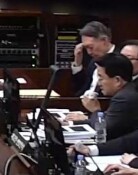[Opinion] KBS Style
The British Broadcasting Corporation (BBC), the U.K.s public broadcaster, is widely said to be somewhere between the Queen and the Beatles. As a synonym for high-quality broadcasting service, BBC has long enjoyed the wholehearted trust of the British public. Nevertheless, it has recently been suffering from a severe crisis. It lost its scarcity value with the emergence of a growing number of new media, and it suffered enormous challenges from private broadcasters. Eventually, BBC decided to undertake a corporate restructuring. The outline of the plan is to lay off 4,000 out of a total of 27,000 employees. This means that in the end, BBC finally gave in to mounting criticism from its viewers over its lax management.
Japans Nippon Hoso Kyokai (NHK), which is considered one of the most representative public broadcasters along with BBC, suffered damage in its reputation when its employees were reported to have embezzled production costs. Then-NHK Chairman Katsuji Ebisawa appeared on the public broadcasting network to apologize that the incident was something that should not have happened for NHK, which is financed by the publics receiving fees. His apology, however, failed to pacify the angry viewers. Chairman Ebisawa finally stepped down, and NHK introduced a negative budget, compared to the previous year, for the first time ever. However, many Japanese citizens are still refusing to pay receiving fees for the network.
Coincidentally, the Korea Broadcasting System (KBS), Koreas public broadcasting network, faced a crisis at the same time as these two broadcasters. KBS lost 63.8 billion won last year, and is expected to record a deficit of 80 billion won this year. However, KBSs measures to innovate its management are quite different from those of BBC and NHK. While BBC and NHK focused on streamlining lax management and regaining trust, respectively, KBS demanded an increase in receiving fees and permission to air commercial breaks. This indicates the arrogance of KBS, which seemingly aims to pass on the huge deficit, caused by its loose management, to the public. Any sense of responsibility among the senior management or contrition toward the viewers is nowhere to be found. Is this the KBS style?
Also on the KBS plan are a wage cutback and layoffs, but these things seem to be a mere excuse for raising receiving fees. In fact, KBS, which has continuously faced arguments over its impartiality, is no match for BBC and NHK, which have long built public confidence. The fact that KBS sticks to increasing receiving fees rather than reducing its size means it still does not fear the public.
Hong Chan-sik, Editorial writer, chansik@donga.com



![[단독]김경 “1억원 줄때, 강선우도 함께 있었다” 자수서](https://dimg.donga.com/c/138/175/90/1/wps/NEWS/IMAGE/2026/01/14/133148772.5.jpg)

![반찬통 착색 고민 끝…‘두부용기’ 버리지 말고 이렇게 쓰세요 [알쓸톡]](https://dimg.donga.com/c/138/175/90/1/wps/NEWS/IMAGE/2026/01/09/133126593.3.png)

